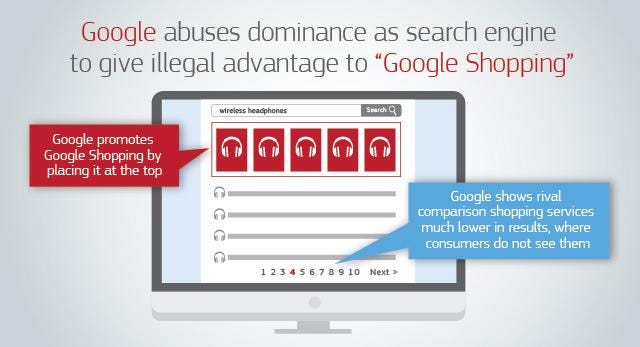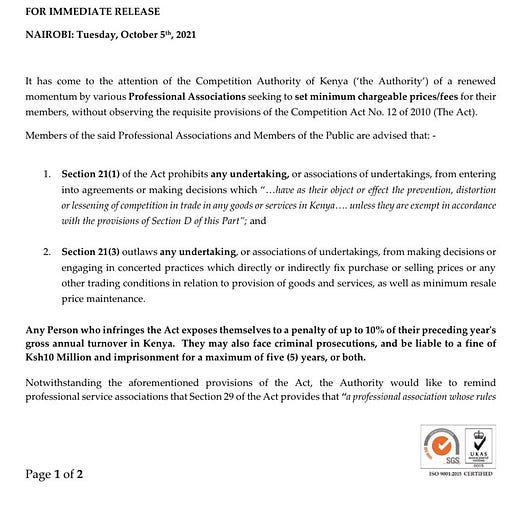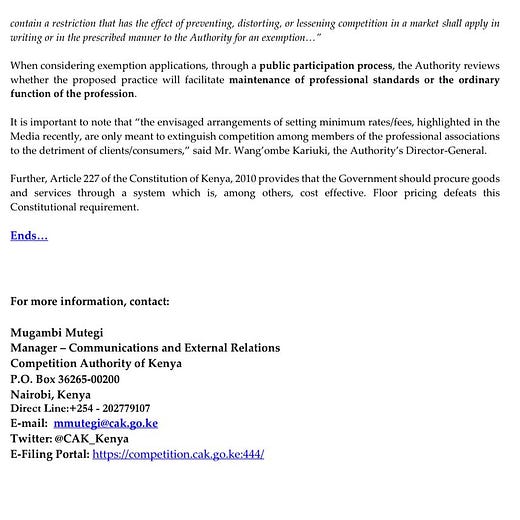Legal profession
Can law firms be anticompetitive?

Recently, the Competition Authority of Kenya (CAK) issued a public notice to professional associations who are seeking to set minimum chargeable fees for their members. So, imagine if the Nigerian Bar Association prescribed minimum fees that Nigerian lawyers can charge their clients. And the notice reminded the associations of their obligation to comply with the provisions of the Kenyan Competition Act.
You might ask: what business does a competition authority have with how professional service providers charge their clients? Well, because it would amount to price fixing. If all the lawyers or accountants or consultants agreed how much to charge their respective clients, their clients would be unable to benefit from price competition between professional service providers.
I know we bashed the CAK in our previous post (sorry, not sorry), but this is a very welcome development from them. So much so that it prompted me to think further: why have more competition authorities not looked at professional services? And in particular, why have law firms not been found to be anticompetitive?
After all, there is no reason, in principle, why competition authorities should not look into a particular sector—no sectors are exempt or immune from competition scrutiny.
Just ask the UK’s Competition & Markets Authority (CMA). In 2018, the CMA recommended that the Big 4 professional services firms—that is, Deloitte, PwC, EY, and KPMG—should be broken up, to separate their auditing services from their consulting services.
More recently, in 2019, the CMA opened an investigation into the funeral sector (…of all sectors) and, last year, they found that funeral directors and crematoria were exploiting vulnerable consumers by charging fees which were “well above inflation for at least a decade.”

And the reason the CMA can do this is because the Big 4 firms, funeral directors, and crematoria are all ‘undertakings’ for the purpose of competition law.
An undertaking is an entity that is engaged in an economic activity, regardless of its legal status and regardless of how it is financed. The most important thing here is economic activity, which is when goods or services are offered on a market.
According to the European Court of Justice, providing legal services is an economic activity.1 The Court has also noted that the fact that legal services are complex and technical, and the fact that the legal profession is regulated cannot change the fact that providing legal services is an economic activity.
As such, law firms fall squarely within the concept of an undertaking and can be subject to competition law.
Ok. Let’s bring things back to Africa.
Of course, I already mentioned that the CAK issued a public notice to professional associations, but other competition authorities have similar powers.
For instance, the Federal Competition and Consumer Protection Commission (Nigeria’s competition authority; FCCPC) can encourage professional associations to develop (and help them to enforce) quality standards to protect consumers. The FCCPC can also issue guidelines on how the Federal Competition and Consumer Protection Act applies to members of professional associations. And under the First Schedule of the Act, the associations for lawyers, engineers, architects, doctors, etc., are included as professional associations.

In 2015, the Namibian Competition Commission (NCC) actually went head-to-head with the Law Society of Namibia (LSN). The LSN sought exemptions from the NCC for some of its rules which had implications for competition within the legal sector. The NCC allowed some rules—such as, a rule which prohibited lawyers from charging exorbitant fees. But, importantly, it refused to allow many others—such as, rules to publish fee guidelines, to prevent lawyers from sharing offices, to prohibit practicing or sharing profit with non-lawyers, and to prohibit marketing and touting. Its rationale was to draw a distinction between restraints which are necessary for the profession to function properly and unjustified restraints of competition.
Still, I am yet to see a competition authority go after an individual law firm for behaving anticompetitively. Most of the intervention I have come across focuses on law societies/associations, not law firms, and I wonder why.
Lawyers I have spoken to have said that the legal sector is competitive enough because clients can always move to a different law firm if they are unsatisfied with the service of one firm. They argue that clients enter into voluntary contracts with lawyers and law firms. Also, the fact that many law firms provide a range of the same services, and that law firms frequently undercut each other, buttresses their point that the legal sector is competitive.
I actually agree with them, save for a minor caveat.2 However, the presence of these pro-competitive features in the legal sector does not mean that it is impossible for specific law firms which compete in the same market to be anticompetitive.
I already mentioned price fixing above—it is possible for law firms to fix the prices that they charge their clients. But prices could also be fixed in the opposite direction: on how employees are remunerated.
In our first post on Compedia, we spoke about how the US Supreme Court found that the National Collegiate Athletic Association engaged in price fixing by agreeing how much college athletes could be paid across different universities.3 In the Court’s view, the athletes were being denied the opportunity to go where they would be most remunerated. In other words, the athletes were unable to benefit from competition between universities.
Similarly, if law firms informally agreed on how much the entry-level salary for lawyers should be, that would be price fixing.

Law firms could also decide to share markets. This might be done geographically (e.g., you take the North, I take the South), based on particular sectors (e.g., you take automobile, I take aviation), or based on a particular type of legal work (e.g., you take tax, I take finance).4 Nonetheless, the outcome is the same: clients will experience less competition between law firms—which might result in higher prices and lower quality legal services.
And finally, it is entirely possible for law firms who bid for contracts against each other to engage in bid-rigging. They could enter into an informal (or maybe even formal) agreement amongst themselves, through which, they decide to take turns to bid as a way to soften the competitive pressure between themselves.
That said, I do not mean to suggest that these practices are definitely happening. I have no evidence to prove or disprove them. But what I hope to show is that these practices are, in theory, possible. So, to answer the question that is the subtitle of this article: can law firms be anticompetitive? My answer is yes.
Before you go…
…here are some recent developments in the world of competition law:
Shipping cartel in Nigeria: A few weeks ago, the FCCPC completed a dawn raid to gather evidence from five companies in the shipping and freight forwarding industry. Why? Well, the FCCPC had good reason to believe that the five companies had formed a cartel which was distorting and preventing competition in Nigeria. Elsewhere, the dawn raid was characterised as an “invasion…by armed security men who held workers hostage…,” and that the FCCPC “proceeded to unleash mayhem on innocent working members.” A very unflattering framing of a standard method that competition authorities around the world use to catch cartels.
Google in Europe: In 2017, the European Commission (EC) found that Google abused its dominance in the general search market. What Google did was to favour (or self-preference) its own comparison shopping service,5 Google Shopping, over competing comparison shopping services, such as Yelp and FairSearch. And this favouring was by placing Google Shopping in a better, more eye-catching, position on Google Search than its competing services.

Google was fined €2.42 billion. They appealed. And last week, in a historic and landmark decision, the European General Court made four conclusions: (i) the practice was anticompetitive; (ii) the practice harmed competition; (iii) there were no objective justifications for Google’s conduct; and (iv) the EC’s fine should be upheld.
Case C-309/99, Wouters [2002] ECR I-1577, paras. 48-49.
I would add a small caveat that most clients do not understand legal services well enough to make an informed decision about which law firm best suits their needs. And this is a market failure because there is an information asymmetry that prevents competition from functioning properly. I develop this idea further here: Five Lessons on the Future of Legal Practice (in particular, pp. 5-7).
Margrethe Vestager, Europe’s Competition Commissioner, recently stated her intention to intervene against ‘wage-fixing’, which keeps wages down, and ‘no-poach agreements’, which prevent talent from moving where they can best serve the economy.
Of course, this is an oversimplification intended to demonstrate a point. If market sharing was really to happen, it would be amongst multiple firms. Most likely the larger firms, the ‘magic circle’ firms in a given country, who have most of the market share, and have decided to divide and share markets (or clients) as a way to entrench their dominance.
Comparison shopping services allow you to compare products sold by different sellers across the internet.



